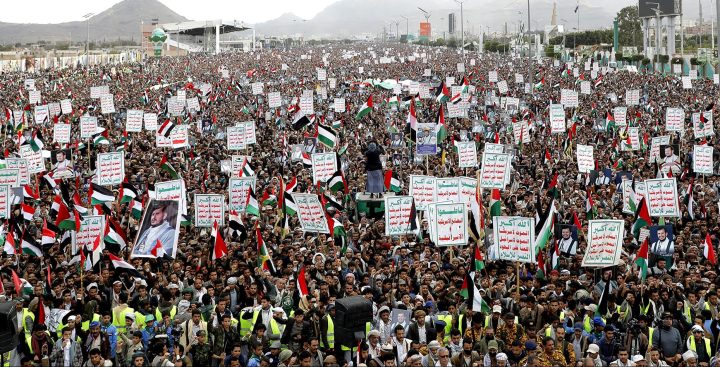MIDDLE EAST CRISIS UPDATE: 3 JANUARY 2024
Iran’s Red Sea power play heightens trade disruption fears; Turkey rounds up suspected Mossad spies

Tensions remain high in the Middle East as Iran sends a warship to the Red Sea, but it’s unlikely this will lead to a confrontation with the US-led task force in the waters off Yemen.
Iran’s dispatch of a warship to the Red Sea is its boldest move yet to challenge US forces in the key trade route, emboldening Houthi forces whose missiles have disrupted shipping over the past two months.
Tehran is unlikely to want direct confrontation — its old frigate being no match for the US-led maritime task force patrolling the waters off Yemen — but it takes the projection of Iranian power in the region to another level.
That raises tensions after the Houthis started attacking vessels they claimed were headed to or owned by firms in Israel in a bid to end the military assault on Gaza.
Iran has rejected calls from Western powers to pressure the Houthis to end their attacks in the Red Sea. Some of the latest ships targeted by the rebels don’t have clear links to Israel, according to Kevjn Lim, a Tel Aviv-based analyst at S&P Global Market Intelligence. That includes an attack on an AP Moller-Maersk A/S container ship, after Denmark said it was joining the task force.
“They aren’t showing a willingness to de-escalate, so we’re likely to see further targeting of commercial assets and US maritime ships going forward,” Lim said.
In response to the Houthi attacks, some of the world’s biggest shipping firms have refused to transit through the Suez Canal, complicating flows between Europe and Asia and forcing some vessels to take the more costly route around the Cape of Good Hope.
The tensions have also prompted jitters in the oil markets, with crude climbing more than 2% as New Year trading opened.
On Monday, Iran’s Foreign Minister Hossein Amirabdollahian blasted what he called the West’s double standards on Gaza, accusing the US and its allies of caring more about disruptions to global trade than civilians being killed in Israel’s bombardment of the Palestinian enclave.
Still, Iran may be reluctant to enter into a direct war with the US, not least after Washington’s loose implementation of sanctions allowed Tehran to boost oil exports.
“This Iranian destroyer is just for media consumption, targeting a domestic and regional audience — displaying Iran as a regional power capable of deploying naval assets to challenge the US,” said Riad Kahwaji, the Dubai-based head of the Institute for Near East and Gulf Military Analysis.
“But it is unlikely that this destroyer will confront the Western warships in the area because Tehran does not want to get into a war with the US.”
Turkey detains alleged Israeli spies as ties sour over Hamas
Turkish security forces detained 33 people for allegedly spying on behalf of Israel’s Mossad intelligence agency, a month after Ankara warned it would respond to any plots to kill members of Hamas on its soil.
The suspects are accused of planning to attack or kidnap foreign nationals living in Turkey, the state-run Anadolu Agency said, without elaborating on the potential targets. Thirteen more suspects remain at large, it added.
Turkey doesn’t classify Hamas as a terror organisation and some of the group’s leaders, including Ismail Haniyeh, are known to visit and stay in Istanbul. That, together with criticism by President Recep Tayyip Erdoğan of Israel’s bombing of Gaza, has thwarted a nascent thaw in ties between the two countries.
Ankara warned Israel in December not to try to kill Hamas members in Turkey, following reports of plans to target the group’s leaders overseas.
“If they commit such a mistake, they should know that they will pay a very, very heavy price for it,” Erdoğan said in December.
Netanyahu boxed in by fierce pressure over war, politics, budget
When Israel’s Supreme Court late on Monday struck down a judicial overhaul law of Prime Minister Benjamin Netanyahu, his Likud party assailed the justices for ruling during the war on Hamas, when national unity is paramount.
But the response to that backlash was telling: It was the overhaul that led to disunity and the war, a growing number of critics are saying. As chief military spokesman Daniel Hagari put it, the sense that Israel was divided and weakened over the court plan may have played a role in Hamas’ decision to attack in October.
The chorus of voices that are seizing on the link between the war and the populist attempt to weaken the judiciary reflects a growing and intense set of constraints on Netanyahu — military, diplomatic, budgetary and judicial — as he begins his second year presiding over the most right-wing and religious coalition in Israel’s history.
Whether his government will survive 2024 is a renewed topic of debate that will now play out against the backdrop of Israel’s worst armed conflict in half a century.
“There is a real dissonance between his control of parliament and the strong mistrust by the public — and it’s a dissonance I don’t think can last,” said Amichai Cohen, a senior fellow at the Israel Democracy Institute, a liberal think tank.
Others argue that as long as he keeps his coalition partners happy with budgetary largesse, Netanyahu will remain in office. At the same time, critics that include the central bank are calling for fiscal adjustments such as spending cutbacks to get a grip on Israel’s growing debt burden.
There are many factors at work as Netanyahu plots his way through the upheaval.
Hours before the high court’s ruling, the military said it was pulling thousands of troops from Gaza as it started moving toward a more targeted phase of combat. It’s doing so, by all accounts, due to US pressure to reduce casualties and start planning for the day after in Gaza.
It also needs to return reservists to their day jobs, filling a void that’s paralysed swathes of what had been one of the most dynamic hi-tech economies in the world. Apart from its sheer human toll, the war will come at a price to the budget that the central bank estimates at around 210 billion shekels ($58-billion).
In addition, South Africa is taking Israel to the International Court of Justice in The Hague, accusing it of genocide in Gaza. Israel, which rejects this as a “blood libel”, plans a vigorous defence, according to the prime minister’s office.
But officials say that’s another reason to downgrade the war just now — pictures of bombs exploding over civilian areas won’t help Israel’s case.
Israel cuts force size in Gaza as it enters next phase of Hamas war
The military said it would begin withdrawing several thousand troops from Gaza — two brigades will return home this week and three others will come out for scheduled training — but its top officers said the war against Hamas will continue for many months.
“This move is expected to significantly alleviate economic burdens and enable troops to gather strength for upcoming activities in the next year, as the fighting will persist and their services will be needed,” the military said in a statement.
Jonathan Conricus, a former military spokesman, said four factors have driven the change. The first is that the army is largely in control of northern Gaza, meaning fewer troops are needed. Second, a decision has been made to use more restrained firepower as the fighting continues in the south. The third reason is economic. The fourth is the likely need for troops to be available for combat in southern Lebanon later this year as Israel and Hezbollah exchange fire.
The US, which has firmly backed Israel’s war against Hamas, has been pushing it to move to a new phase of more limited and targeted attacks to reduce civilian casualties. The Hamas-run health ministry in Gaza says some 21,000 people have been killed, most of them civilians, since the war started.
Most of northern Gaza is now uninhabitable. Some 1.8 million people across the seaside strip have been displaced. Hunger and disease are spreading, according to the United Nations.
The Israeli government has said it would divide the war into three stages — intense shelling from the air, followed by a ground invasion and then a more targeted set of operations.
Some 170 Israeli soldiers have been killed.
Fierce fighting continues in the south, especially around the Khan Younis area. Although there has been a marked reduction in rocket and missile strikes on Israel from Hamas in recent weeks, at midnight on Sunday, as the new year was starting, some 20 rockets were fired at southern and central Israel.
War budget casts shadow over Israel’s first rate cut since Covid
Israel’s central bank warned the government’s fiscal response to the war against Hamas risks pushing the country into greater debt and could be an obstacle to further monetary easing after it cut interest rates for the first time since the height of the global pandemic in 2020.
The monetary committee on Monday ended a pause in place since July and lowered its key rate to 4.5% from 4.75%, as predicted by most economists. Markets are betting rates will fall below 3.4% by the end of 2024.
An updated outlook from the central bank’s research department showed the government is on track to run a bigger budget deficit than was estimated in November, with the fiscal costs of the war also upwardly revised to around 210 billion shekels ($58-billion).
“A risky fiscal policy can affect rate decisions moving forward,” Governor Amir Yaron said at a news conference, calling for adjustments that cut back expenditure and boost income.
The decision signals priorities are starting to shift in favour of supporting the economy, after an effort by policymakers to steady markets following the October attack by Hamas.
Risks abound, however, as the central bank weighs the implications of fiscal plans linked to the Hamas war, which could saddle the country with a bigger debt load.
The risk that the war against Hamas could expand into a wider conflict is another reason for future caution. Disruption persists across the economy with the deployment of hundreds of thousands of troops, and whole communities evacuated from their homes along Israel’s southern and northern borders. DM




















 Become an Insider
Become an Insider
Comments - Please login in order to comment.